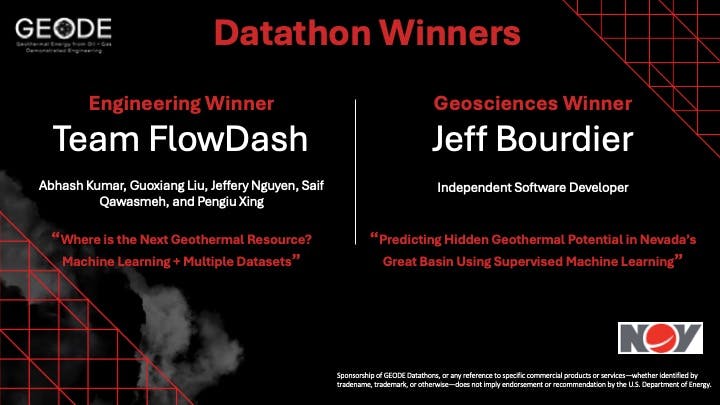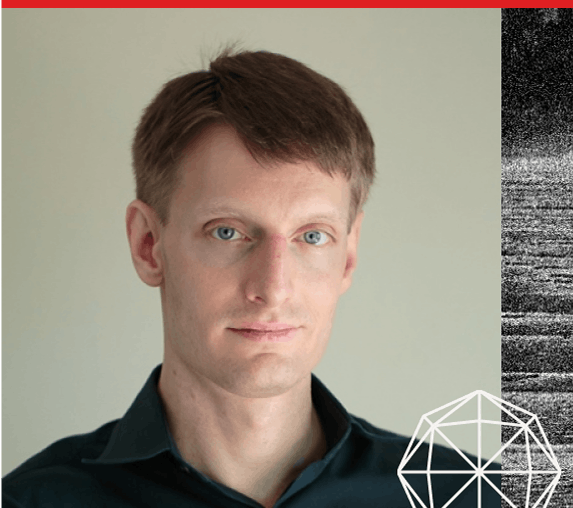
The future of geothermal energy lies in the hands of young engineers, geoscientists, and outside experts entering the field who will drive the sector forward.
That’s why the GEODE consortium hosted two Datathons that tested the skills of emerging subject matter experts. Led by industry experts, the datathons invited students and young professionals with backgrounds in oil and gas (O&G) and geothermal energy to participate in unique challenges that used real, field-case analyses to explore the areas where geothermal and O&G technologies come together.
The response was phenomenal: more than 140 participants from across the United States formed 43 teams representing 27 universities and 25 companies. Teams and individual participants submitted solutions that were innovative and unexpected, creating a difficult decision for the GEODE judges and giving them hope for the future of the geothermal sector.
“The Datathons, built through GEODE and powered by dedicated volunteers, showed the strong interest and skills of a new geothermal workforce ready to lead with data, collaboration, and creativity,” said Higinia Torregrosa, the U.S. subsurface lead for Project InnerSpace who coordinated the Datathons.
The Geosciences Datathon asked participants to develop ways to identify blind geothermal systems. Participants had to create innovative solutions using datasets from Nevada’s Great Basin, a region rich with geothermal activity. Their solutions used geophysics, geology, and machine learning to predict high-enthalpy zones where no surface signals exist.
Roland Horne, a Stanford University professor who specializes in geothermal energy and reservoir engineering, was one of the judges for the Geosciences Datathon and was impressed by the solutions submitted. “A lot of good projects, many of them innovative and well presented,” he said.

After reviewing all the submissions, the judges selected a solo participant as the winner of the Geosciences Datathon: Jeff Bourdier, an independent software developer from Houston who specializes in developing GIS applications. Bourdier used supervised machine learning with XGBoost to predict geothermal potential in the Great Basin, producing predictive raster maps based on fault slip rates, deformation, and heat flow.
"I am truly honored that my work was chosen to win this competition,” Bourdier said. “It was a great learning opportunity, and I look forward to learning more and contributing what I can to the promising field of geothermal energy."
The Engineering Datathon focused on optimizing geothermal energy production through comprehensive data science applications. Participants used multiple datasets, including those from the Utah Frontier Observatory for Research in Geothermal Energy (FORGE), a dedicated underground geothermal field laboratory sponsored by the U.S. Department of Energy. Datathon teams used that information to develop data-driven models to improve subsurface heat exchange and energy recovery efficiency by incorporating earthquake data, fiber optic temperature sensing, tracer tests, hydraulic fracturing logs, and more.
Pushpesh Sharma, director of product management at Aspen Technology and one of the judges of the Engineering Datathon, applauded all the submissions during a virtual awards ceremony on June 20. “I was very surprised by the quality of the submissions,” he said. “I think all of you did a great job.”
The judges decided the winning team was “FlowDash – Geothermal Energy Enhancer,” which included Guoxiang Liu, Abhash Kumar, Jeffrey Nguyen, and Saif Qawasmeh of the National Energy Technology Laboratory and Pengju Xing of the University of Utah. The team created a framework driven by machine learning that integrates seismic, structural, thermal, and mineral data to map fracture networks and pinpoint optimal drilling locations. Liu said their “dream team” benefited greatly from being able to demonstrate their innovative approach in such a competitive environment.

“The GEODE Datathon was a great opportunity to practice our technologies from the oil and gas energy sector for the geothermal industry,” Liu said. “The work shows the possibilities and potential for such objectives moving forward.”
The Datathons were sponsored by NOV, the Houston-based provider of O&G equipment and components. First place submissions received $500, second place received $300, and third place received $200.
Geosciences Datathon Winners
1st Place: Team “FlowDash – Geothermal Energy Enhancer”
Team members: Abhash Kumar, Guoxiang Liu, Jeffrey Nguyen and Saif Qawasmeh of the National Energy Technology Laboratory (NETL) and Pengju Xing of the University of Utah
2nd Place: Team “Operation Hotspot”
Team members: Emmanuel Ikpesu and Fehmi Ozbayrak of the University of Texas-Austin
3rd Place: Team “Fracture Flow Facilitators”
Team members: Juan Carlos Soberanes Merodio, independent drilling optimization manager, Oluchi Osuagwu, independent data scientist, Loic Bethel Dje of Oklahoma State University, and Vivek Kesireddy of Texas A&M University
Engineering Datathon Winners
1st Place
Jeff Bourdier, independent software developer
2nd Place: Team “Operation Hotspot”
Team members: Emmanuel Ikpesu and Fehmi Ozbayrak of the University of Texas-Austin
3rd Place: Team “Geothermal Titan”
Team members: Chuen Song Chen, Sean Zou, Xiaohui Xiao, Huihui Yang and Zexuan Dong of Shell
Geothermal Energy from Oil and Gas Demonstrated Engineering (GEODE) is a consortium led by Project InnerSpace and the Society of Petroleum Engineers (SPE) and funded by the U.S. Department of Energy’s Geothermal Technologies Office (GTO).
Sponsorship of GEODE Datathons, or any reference to specific commercial products or services – whether identified by tradename, trademark, or otherwise – does not imply endorsement or recommendation by the U.S. Department of Energy.